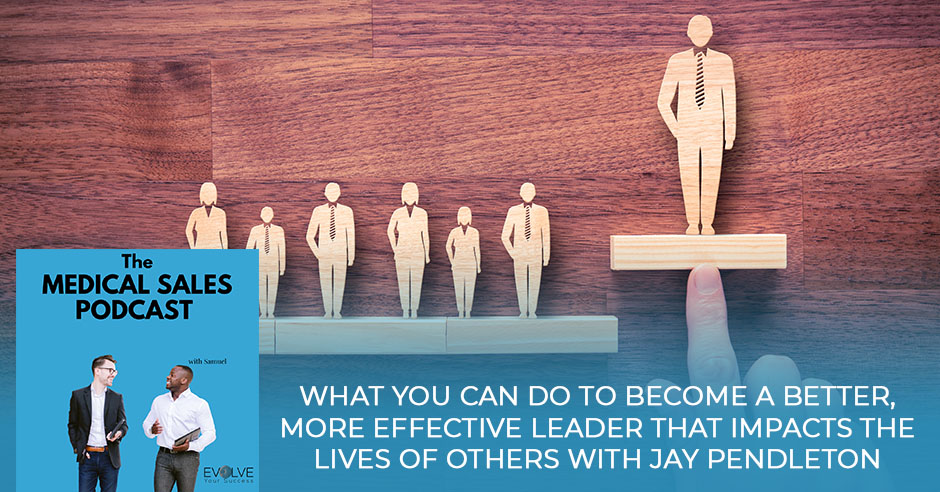
Great leadership is more than just having the highest position. It’s about being an effective leader that knows how to treat your people and connect with them on the same level. Samuel Gbadebo talks with Jay Pendleton, the Director of Talent and Strategy in Medtronic, about his discoveries as he took on the role and what it means to be a medical device sales representative. Jay notes that becoming an effective leader means having that situational awareness and emotional acuity and having different skill sets that you can harness whenever needed. To him, being a leader is more about being of service to others, empowering them, taking notes, and listening.
—
Watch the episode here
Listen to the podcast here
What You Can Do To Become A Better, More Effective Leader That Impacts The Lives Of Others With Jay Pendleton
We have part two with Jay Pendleton, Director of Talent and Strategy in Medtronic. He’s going to go deeper into the insights of what it means to be a Medical Device Sales Rep, how to be a better and more effective leader and how he practices, maintains and does all the things he does to impact the lives, the impacts in the position he is in and for everyone that’s listening on the outside. Again, it’s Jay Pendleton. It’s a great interview and I hope you enjoy it.
—
The thing is, every day is an opportunity. It’s a gift. Every day is an opportunity to improve yourself and the lives of those around you. I’m a big believer in doing things the right way. In this industry, specifically what Scott taught me and what I have always done and what I taught my associates is to be a good person. Treat others with respect, love and be kind. If they use four screws, put four screws. Why would you ever put anything else? The people that are out there trying to game the system and sharing the commission with their surgeons, whatever it is that they are doing, that’s just wrong. It was actually offensive to people like me and others that have done it the right way.
You are shining right now, Jay, in all the ways you would like to be. I love it. I aligned with it completely. I will take it. I want to talk a little bit about leadership. You were a West Area Manager or Regional Manager but then you didn’t get into the executive level and now you are the Director. With our audience, remember, we have people that want to get into the industry, are in the industry and are leading the industry. What you should be mindful of if you want to make that transition. If you are a performer, they are trying to feel like you. I’m doing what I can, I love what I’m doing but I want to do more. I want to do more of a top-line position. What should I be thinking about? How should I be operating?

It depends on the individual, their experience, background and skillset. I’m good at some things, bad at others. I know that. Work on your weaknesses and harness your strengths. I’m an empathetic leader and person so I lead with empathy, high integrity, courage and delegation. It’s okay if you don’t know the answer to something. It’s okay if you need to bring in somebody else to help. That’s totally fine. As a leader, I’m a connector of all these different people and specialties. One of the things to work on would be, you could be a really good rep out there in the field, serving your customers, doing a great job and making a great living but can you not be the star? Can you empower others to be the star? Listening is a passive skill that I have to work on because I’m a talker.
Having that situational awareness, emotional acuity, understanding people and how they like to be communicated because everybody is different. We have seen some successful reps in the room, aren’t successful managers. I think part of that is because they were completely different skillsets. The other part of that is that there are little to no direct manager training. There are sales training and product training. A lot of that but is there manager training? What’s the playbook? One of the things that I’m helping to work with Medtronic to work on is developing that playbook, communication, cadence and helping managers because the impact of the available manager is missing.
Managing your former colleagues is a difficult dance. I feel that the only way to do that, at least in my mind and how I was able to do that effectively and successfully, relies on them more. There are tons of ideas from everybody out there throughout the organization. Just because I’m in some leadership role does not mean that I have the best ideas. If anything, I’m the microphone for their ideas. I will promote their ideas more aggressively than I am because I have conviction and I believe in them. It’s empowering others. As a leader, that’s what I do. I listen, I take notes, I’m available and I have the ability to connect with others. I doubled down on that. There wasn’t any rockiness. Initially, it’s done. How could it not? It would have hurt some of me. That’s what I’m talking about.
You are a Director of Strategy and Talent. Let’s talk about that role. What is the piece of discovery you found getting into this role? Maybe it’s a surprise to you that you didn’t know of it.
[bctt tweet=”Every day is an opportunity to improve yourself and the lives of those around you.” via=”no”]
I don’t know about a surprise but what I have discovered is there are a lot of problems and things you can try and fix. If you try to fix everyone, you will get nowhere. You are a Jack of all trades, a master of none. Again, back to efficiency in how I plan my day, if you wanted to talk a little bit about that routine, you have to do the same thing in the projects and the initiatives that you take on. What are your deliverables going to be? What’s your output? Be very intentional about where you spend your time, how you spend it and who you are spending it with. There’s a tendency for people to put on a bunch of conference calls and I get that. That’s Corporate America, that’s culture but I have pushed back on some of those because I have to make sure that I’m leaving enough time to work.
I would be very intentional in talking about my routine and I have learned this in this new role. I have to guard my time. I need to quickly make allies and connections with different people across the organization that I used to not interface with. You do that. The same skillset, listening, being empathetic, and understand what’s important to them. Ironically, these are the same traits that I use to build my territory in sales as a rep. You have to listen to a certain customer, you have to understand what’s important to them and you have to show them value. I have a seat at the table of BD, Business Development. What are the next acquisitions that Medtronic is going to make? Very exciting and I’m honored to be part of this but instead of a seat at the table, my thought was, “Let’s bring some ideas to that table.”
If they get shut down, they get shut down but let’s bring some value to that team. As much as I’m recruiting competitive hires, I’m also recruiting innovative companies that potentially could be underneath the Medtronic umbrella at some point. It’s exciting. I have learned in a short order that be intentional about everything you say and you do, treat others with respect and turn the camera on in this day and age. They need to see you. They need to know who you are unless I’m driving or on a call that’s not conducive to video, 50 people and 1 person is presenting. In the calls where you are on, be intentional. Spin that time with intention and turn the video on, be engaged and be dialed in. When I was in surgery, my phone was not with me because the most important part, sadly enough, even more than my family at that moment, was that patient on the table.
Nothing was going to distract me from my focus on my eyes and ears, in that Spidey sense on the room on the surgeon and what was happening, not only then but what was going to be happening very shortly. Keeping the whole staff, 5 to 7 steps ahead of the surgeon. That’s my value. Let’s do that same thing in this space. What’s next? My boss and I have a great relationship. He gives me great direction but a ton of autonomy and latitude, which I love because now, I’m able to spend the time necessary to do things that are a little bit unconventional. Videos on LinkedIn, I don’t spend a ton of time during the working hours on that.

I try to spend the dark hours doing that because there are just so many hours in a day. That, to me, is a strategy. It’s how I’m going to reach out and how I have already reached multiple different spine reps. I connected with two that I used to work with that want to talk and learn more about Medtronic. That’s why I’m doing what I’m doing and that’s the method to the madness, so to speak. Don’t get me wrong. There are some questions about it. Some people are being like, “What is Jay doing?” I realized I’m not everybody’s cup of tea but I don’t have to be. I didn’t have to be the cup of tea for the people that want to join the organization and want to learn more about Medtronic. That’s what I’m here to do.
It couldn’t be said better. With that being said, real quickly, give us your daily routine. What time are you up?
I try to get up by 5:00 or 5:15. It used to be earlier. When I was a rep, the best earning year, the best rep years when I was super busy, I woke up at 4:30, I did CrossFit before, traveling and driving to the OR.
You try to get fit before going to the OR.
5:00 or 5:15 class so 5:15 to 6:15. Normally, you need to be at the hospital at about 6:30 in some cases. I could only do this towards that end where I had trusted individuals on my team, both North and South, different locations, different hospitals, where we would together go through the stuff the night before everything was laid out. Here’s what to open, here’s what the whole in terms of trays. I would be there and I had this down to a science. I knew when I needed to leave and how I needed to go. I would be there before the surgeon walked into the room and looked at the MRIs and the images.
At that point, the roles changed. The associate is then behind my shoulder, watching me, watch the surgeon who looks at the MRIs. They are learning what I’m saying, what I’m not saying and what I’m asking. That’s how they live. Getting trays into the room, I don’t need to be there for that. Not that I’m above it by any means. I wouldn’t ask anyone to do something that I wouldn’t do at the drop of a hat. I took all the trauma call for my territory. I always gave the associates the option. They want to stick around, great. If not, do it on the weekend. These are my relationships.
You could ask about my routine. That was then, this is now. I wake up at 5:00. I set the intentions for the day, journaling, reading, prayer, working out sometimes. If I look ahead and I have a really busy day where I realized that I’m not going to be able to exercise and I will do it first thing in the morning. I don’t do that every day but I probably do that three times a week where I will go knock out my exercise. For me, to hustle and grind in the office and the field, business travels picking up, I’ve got twelve nights over the next six weeks. I’m going to be out. It’s a lot. I have to get some form of exercise in. That stems from the transformation that took place in my life where I turned 40 years old. I was overweight, I was out of shape and I’m not happy.
[bctt tweet=”Be a good person. Treat others with respect and love and be kind. ” via=”no”]
We moved into a new place. I was far away from my gym then quarantine hit. I wasn’t traveling but I didn’t have any place to exercise except for my garage and my driveway. I had three kettlebells and a plyo-box. I committed to moving every single day. Ironically, it was the one-year anniversary of when all that started, April 24th, 2020. April 20th of 2020, I did a burpee challenge and I was so exhausted and out of shape. I came inside and I’m like, “I need to do something.” It was that catalyst moment but April 24th is the one year of moving every single day for 365 days and changing the barometer. The barometer for me wasn’t a long-distance or long time. It was breaking a sweat. You want to change your shirt.
I got to do that every day. Routine-wise, my exercise will move and fluctuate related to when my conference calls, surgeon meetings, scheduled things and kids’ stuff. You have to fit it in. You have to find a gap, just like when I was a rep in the room. You have surgery that dictates your schedule. In between surgery, what are you doing? Are you making a sales call? Are you turning over trays for the next surgery? You have to be productive throughout the day and get as much as you can of every hour of every day. That’s my routine in a nutshell. It’s extremely intentional, guard your calendar and book time on the calendar to exercise. If it’s in my work calendar, it’s not moving.
Typically, I try to do it before anything starts in my new role but sometimes, it’s the middle of the day. It’s the only time I can fit it in or in the evening. That’s a big part of the routine. One more point is when I’m working. What I mean by that is when I’m in my journal, writing out strategy, phones are off, no outlook and notifications are off, everything. There are so many distractions. If you think about the efficiency of working from home, for those that transition may be from an office space, with the cubicles or whatever like I used to work at IBM or regardless, you were at a place with more people, there were distractions. People were coming by your office, dropping in, chit-chat or redirection on a project.
That happens digitally now. The beauty of it is that you can turn all those things off. You can turn off your notifications. You can dive into your work. I will plan that as well in my calendar when it’s time, I have a deliverable, object that’s due and we had a meeting with the CEO. I didn’t do a lot of the presenting but I was preparing a lot of the information for that meeting. To prepare for that meeting adequately, I needed time. I needed to speak with other people throughout the organization and allow for time to schedule that. It’s a lot. You would be surprised how easily we can get distracted. It’s incredible. Remember, there was a time when none of us had iPhones?
It’s funny you bring that up. A lot of people during these quarantine times haven’t been able to manage the home life very well because it’s so easy to get active in whatever you need to do and there’s nothing that tells you to stop. If you are on your own, you’ve got to figure out and give yourself your own stops to whatever it is you are working on. You have to be intentional. Either nothing is going to get done or you are going to be in a flurry of this busyness and probably still feel like nothing got done.
The majority of my workouts are in my driveway in my garage and what I learned is that discipline is just like any other muscle. You have to exercise it to use it. Discipline and grit, I feel are built for me, at least, by doing difficult things. In the morning, waking up, regardless of when I’m working out, I will do ten pull-ups. I couldn’t tell you why but it’s something really challenging that I do first thing. You do something challenging early on and the rest of your day is easier. I don’t have that make your bed mentality that the Navy SEAL is talking about. It impairs you for the day.
With that being said, Jay, what overlying theme or even an underlying theme that grounds you and keeps you going and the way you operate? What would you like to leave with the audience for your wrap-up?
[bctt tweet=”Work on your weaknesses and harness your strengths. ” username=””]
What’s your legacy? What are people going to remember you by? What are you doing now to get there? That’s a video that I shot in my car. I have two young boys looking at me every single day. We talk about you are the mirror. They are seeing what I’m doing and I need to be a good example and a leader for them as my role as their father. The same thing applies to my work. I need to lead by example, through others that I come across with. I don’t have direct reports any longer than I did. During that time, when I had direct reports, I was always there for my employees. I was almost brought to tears when I was preparing for interviewing for this new position internally. My entire team, maybe with the exception of 1 or 2 who were stuck in surgery, sent me letters of recommendation.
You are talking like really well articulated, an outpouring of support for me and how great of a boss I was. In the interview, when I was asked by, “What is my proudest moment of Medtronic,” that was it. There’s not a close second. It’s the fact that I was able to have a team of fifteen seasoned professionals. All cohesive in one team, supporting one another, loving one another, being there for another, getting on a plane and traveling their last minute for one another, answering the call and having a community. To be the captain of the ship of that, we call ourselves the Westeros team from Game of Thrones fans out there. Westeros because we were at the West where we live. It was truly special. I will never forget getting those letters and being able to show my letters of recommendation from my direct reports and also people that I work with cross-functional teams, internal sales, training and marketing. It was a great thing for me. Basically, what impression are you leaving on people? That’s the challenge that I would ask for those reading. What are you doing every single day to improve your lives or the lives of others?
Thank you for that, Jay. Thank you for giving us the time on the Medical Sales Podcast. We will also be forward to your continuous videos and the different ways you continue to reach everybody you want to join and be a part of Medtronic. Thanks again.
Thanks, Daniel. I appreciate it.
—
That was some more great insights from Jay Pendleton. We’ve got into it a little bit around the dynamics that play behind when people want to be leaders and when there are opportunities for growth within the team. I don’t want to say politics but what everyone needs to be aware of their strategy, trying to get ahead in their career, Jay, sees so much of that considering his position and he’s grown so much to the organization. His insights are always powerful and noteworthy. We thank him for being on the show and sharing them with us. What leads me to talk about is one thing that we have in our program. I want you guys to know that you are looking to get into any healthcare sales industry. We have an offer where we allow someone that wants to get into the program. Come and attends an actual group client session. Most likely with a guest speaker at 3:30 Pacific Standard Time. Learn something that you can use immediately after that session.
You can put it into action, whether we are talking about how to build a resume right, who to give it to, how to connect on LinkedIn, how to assess certain interview questions, how to build your career portfolios or discussing how to set yourself up to have amazing interviews in a mock interview practice format. There are so many resources and questions to ask. We invite you again to come at 3:30, Pacific Standard Time. Join and listen to a session. These are some insights from some experts on how to get into the industry you want to get into. We also have those that want to improve their sales performance. You are a team leader, regional sales manager or sales director. You are saying, “I want to take my team to entirely new heights. What can I do differently?”
This is where we want you to check out the Sales Builder Program. You can find us at our site, EvolveYourSuccess.com or find me on LinkedIn under Samuel Adeyinka. If you are an individual professional, that’s saying, “This year, I’m going to be great. I’m going to make things happen. I can’t wait. Where can I learn how to do it?” Follow the prompt, Improve Sales Performance, set up some time and have a conversation with one of my client specialists. As always, we love bringing you amazing content, great interviews with great people from great companies. Make sure you stay tuned for the next episode and we will see you then.
Important Links:
- Medtronic
- Sales Builder Program
- Jay Pendleton – LinkedIn
- Samuel Adeyinka – LinkedIn
- Improve Sales Performance
About Jay Pendleton

Medical device sales leader with 18 years experience in relationship sales and territory management with a proven track record of crushing PTQ and enjoying continued y/o/y growth. Shifted roles from a high performing intra-operative sales rep into a Sales Manager in the competitive Western US market. Recruited and led a team of regional managers for OLIF, Complex Spine, Titan Nanotechnology, Medicrea and various leadership positions across the company.
Today, as Director of Strategy & Talent, I am honored to drive sales strategy as well as recruit talent for Medtronic’s Cranial & Spinal Technologies (CST) division.
If you are a rep or associate in the Spine/Neuro/Robotics space, interested in Medtronic, and feel that you have what it takes to succeed in the competitive field of spinal implant medical sales — give me a shout!



















































































